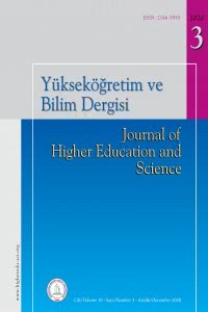Üniversite Öğrencilerinin Engelli Bireylere Yönelik Tutumları ve Sosyal Beğenirlik Düzeyleri
Engelli bireyler, Engellilik, Sosyal beğenirlik, Üniversite öğrencisi
Attitudes toward the Disabled and Social Desirability among University Students
Disabled persons, Disability, Social desirability, University students,
___
- Antonak, R., & Livneh, H. (2000). Measurement of attitudes towards persons with disabilities. Disability and Rehabilitation, 22, 211-224.
- Au, K. W., & Man, D. W. (2006). Attitudes toward people with disabilities: A comparison between health care professionals and students. International Journal of Rehabilitation Research, 29, 155-160.
- Barnartt, S. N., & Altman, B. M. (2001). Exploring theories and expanding methodologies: Where we are, and where we need to go? London: Emerald Group Publishing Limited.
- Barnes, C. (1991). Disabled people in Britain and discrimination. London: Hurst and Co.
- Brandes, J. A., & Crowson, H. M. (2009). Predicting dispositions toward inclusion of students with disabilities: The role of conservative ideology and discomfort with disability. Social Psychology of Education, 12, 271-289.
- Chen, R. K., Brodwin, M. G., Cardoso, E., & Chan, F. (2002). Attitudes toward people with disabilities in the social context of dating and marriage: A comparison of American, Taiwanese, and Singaporean college students. Journal of Rehabilitation, 68(4), 5-11.
- Downs, P., & Williams, T. (1994). Student attitudes toward integration of people with disabilities in activity settings: A European comparison. Adapted Physical Activity Quarterly, 11, 32-43.
- Dökmen, Z. Y. (2000). Engellilere yönelik tutum ölçeği, geliştirilmesi, geçerliği ve güvenirliği. (bildiri). XI. Ulusal Psikoloji Kongresi, 20-22 Eylül, Ege Üniversitesi, İzmir.
- Feinberg, L. B. (1967). Social desirability and attitudes toward the disabled. Journal of Counseling & Development, 46, 375-381.
- Goffman, E. (1963). Stigma. London: Penguin.
- Haegele, J. A., & Hodge, S. (2016). Disability discourse: Overview and critiques of the medical and social models. Quest, 68, 193- 206.
- Hunt, B., & Hunt, C. S. (2000). Attitudes toward people with disabilities: A comparison of undergraduate rehabilitation and business majors. Rehabilitation Education, 14, 269-283.
- iletişimini ve bütünleşmesini pekiştirecek türden faaliyetler ve
- Şahin, H., & Akyol, A. D. (2010). Evaluation of nursing and medical students’ attitudes towards people with disabilities. Journal of Clinical Nursing, 19, 2271-2279.
- Tervo, R. C., & Palmer, G. (2004). Health professional student attitudes towards people with disability. Clinical Rehabilitation, 18, 908-915.
- World Health Organization (WHO). (2015). WHO global disability action plan 2014–2021: Better health for all people with disability. Geneva, Switzerland: WHO Press. Retrieved dle/10665/199544/9789241509619_eng.pdf?sequence=1
- Voh, J. (1993). On belonging: A place to stand, a gift to give. In A. P. Turnbull, J. A. Patterson, S. K. Behr, D. L. Murphy, J. G. Marquis, & M. J. Blue Banning (Eds.), Cognitive coping, families and disability (pp. 151-163). Baltimore: Brookes.
- Yazbeck, M., McVilly, K., & Parmenter, T. R. (2004). Attitudes toward people with intellectual disability: An Australian perspective. Journal of Disability Policy Studies, 15, 97-111. Retrieved from https://www.researchgate.net/publication/240731471_ Attitudes_Toward_People_with_Intellectual_DisabilitiesAn_ Australian_Perspective
- Schwartz, C., & Armony-Sivan, R. (2001). Students’ attitudes to the inclusion of people with disabilities in the community. Disability & Society, 16, 403-413.
- Slevin, E., & Sines, D. (1996). Attitudes of nurses in a general hospital towards people with learning disabilities: Influences of contact, and graduate-non-graduate status, a comparative study. Journal of Advanced Nursing, 24, 1116-1126.
- ISSN: 2146-5959
- Yayın Aralığı: 3
- Başlangıç: 2011
- Yayıncı: Bülent Ecevit Üniversitesi (Önceden Zonguldak Karaelmas Üniversitesi)
KADRİYE FUNDA BARUTÇU YILDIRIM, Esra ERET ORHAN
Türkiye’de Kadın Akademisyen Olmak
Akademisyenlerin İş Yükü Algıları ile İş ve Aile Çatışmaları Arasındaki İlişki
Açık ve Uzaktan Öğrenmede Laboratuvar Uygulamaları
Türk Halk Müziğindeki Doğal Çok Sesliliğin Müzik Eğitimindeki Yansımaları
Yükseköğretimdeki Öğrencilerin Yaşam Kalitelerinin Belirlenmesi
Zennure ADIGÜZEL ŞAHİN, Göktuğ BENLİ, MEHMET SELMAN DEMİRCİ, Fatma Güler KAHRAMAN YILDIRIM
